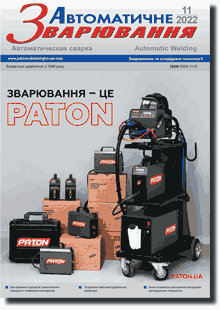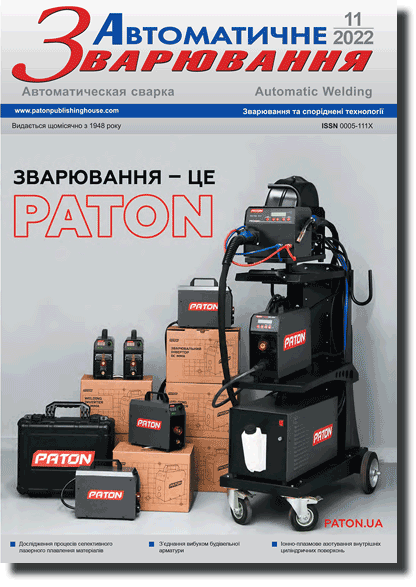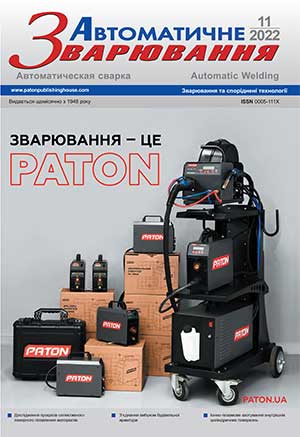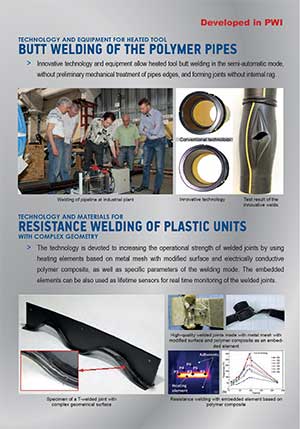| 2022 №11 (07) |
DOI of Article 10.37434/as2022.11.08 |
2022 №11 (01) |

"Avtomatychne Zvaryuvannya" (Automatic Welding), #11, 2022, pp. 52-56
Effect of preliminary activation of TiAl powder on the process of mechanochemical synthesis of (Fe, Ti)3Al intermetallics
Yu.S. Borysov1, O.M. Burlachenko1, N.V. Vigilianska1, C. Senderowski2
1E.O. Paton Electric Welding Institute of the NAS of Ukraine. 11 Kazymyr Malevych Str., 03150, Kyiv, Ukraine. E-mail: office@paton.kiev.ua
2University of Warmia and Mazury. 2 Michała Oczapowskiego Str., 10719, Olsztyn, Poland. E-mail: cezary.senderowski@pw.edu.pl
The effect of mechanical activation of tial powder on the structural and phase transformations in mechanochemical synthesis of the powder mixture of the composition 60.8Fe + 39.2TiAl, intended to produce Fe3Al intermetallics, alloyed with titanium was studied. Using a semi-empirical Miedema’s model, the changes of Gibbs energy for the binary systems Ti-Al, Fe-Ti and Fe-Al were calculated. The results showed that the driving force for the formation of intermetallic phases for all the binary systems is higher as compared to the formation of solid solutions and amorphous phases. A range of compositions was established, in which the formation of amorphous phases in the binary systems Ti-Al and Fe-Al is possible. Carrying out the mechanical activation of TiAl intermetallic powder in a high-energy planetary mill allowed reducing the size of a coherent scattering from 280 to 9 nm with a partial amorphization. The formation of particles with a homogeneous microstructure consisting of intermetallic phase (Fe, Ti)3Al and Lavhes’s phases – Fe2Ti was established in the process of mechanchemical synthesis of a powder mixture 60.8Fe+39.2 TiAl when using nanostructural TiAl powder. The change in the area of coherent scattering of powders of 60.8Fe+39.2TiAl mixture was evaluated, obtained by the method of mechanochemical synthesis, and it was established that interaction of a nanostructural powder TiAl with Fe begins to occur when the size of the coherent scattering area is <70 nm. The resulting product has an amorphous-nanocrystalline structure with the size of the coherent scattering area of <15 nm. The use of the developed powder in thermal spraying technologies will allow producing coatings based on Fe3Al intermetallics with a nanocrystalline structure, a higher modulus of elasticity and ductility. 13 Ref., 3 Tabl., 5 Fig.
Keywords: mechanochemical synthesis, mechanical activation, titanium aluminide, semi-empirical Miedema’s model, nanocrystalline structure, amorphous phase
Received: 25.07.2022
References
1. Borisov, Yu.S., Borisova, A.L., Burlachenko,A.N. et al. (2017) Structure and properties of alloyed powders based on Fe3Al intermetallic for thermal spraying produced using mechanochemical synthesis method. The Paton Welding J., 9, 33-39. https://doi.org/10.15407/tpwj2017.09.062. Cinca N., Lima C.R.C., Guilemany J.M. (2013) An overview of intermetallics research and application: Status of thermal spray coatings. Journal of Materials Research and Technology, 2(1), 75-86. https://doi.org/10.1016/j.jmrt.2013.03.013
3. Moszner, F., Peng, J., Suutala, J. et al. (2019) Application of Iron Aluminides in the Combustion Chamber of Large Bore 2-Stroke Marine Engines. Metals, 9(8), 847. https://doi.org/10.3390/met9080847
4. Palm, M., Stein, F., Dehm, G. (2019) Iron Aluminides. Annual Review of Materials Research, 49, 297-326. https://doi.org/10.1146/annurev-matsci-070218-125911
5. Alonso, P.R., Gargano, P.H., Bozzano, P.B. et al. (2011) Combined ab initio and experimental study of A2+L21 coherent equilibria in the Fe-Al-X (X = Ti, Nb, V) systems. Intermetallics, 19, 1157-1167. https://doi.org/10.1016/j.intermet.2011.03.025
6. Rafiei, M., Enayati, M.H., Karimzadeh, F. (2009) Characterization and formation mechanism of nanocrystalline (Fe, Ti)3Al intermetallic compound prepared by mechanical alloying. Journal of Alloys and Compounds, 480(2), 392-396. https://doi.org/10.1016/j.jallcom.2009.02.072
7. Lyakhov, N.Z., Talako, T.L., Grigorieva, T.F. (2008) Influence of mechanoactivation and phase- and structure formation in self-propagating high-temperature synthesis. Novosibirsk, Parallel [in Russian].
8. Rogachev, A.S., Mukasyan, A.S. (2012) Combustion for synthesis of materials: Introduction in structural microkinetics. Moscow, FIZMATLIT [in Russian].
9. Korchagin, M.A., Dudina, D.V. (2007) Application of self-propagating high-temperature synthesis and mechanical activation for producing of nanocomposites. Fizika Goreniya i Vzryva, 2, 58-71 [in Russian]. https://doi.org/10.1007/s10573-007-0024-3
10. Borisova, A.L., Timofeeva, I.I., Vasilkovskaya, M.A. et al. (2015) Phase and structural transformations in formation of intermetallic powders of Fe-Al system by mechanochemical synthesis method. Poroshk. Metallurgiya, 7-8, 135-143. https://doi.org/10.1007/s11106-015-9740-5
11. Mousavi, M.S., Abbasi, R., Kashani-Bozorg, S.F. (2016) A Thermodynamic Approach to Predict Formation Enthalpies of Ternary Systems Based on Miedema's Model. Metall Mater Trans A, 47, 3761-3770. https://doi.org/10.1007/s11661-016-3533-4
12. Zhang, R.F., Zhang, S.H., He, Z.J. et al. (2016) Miedema Calculator: A thermodynamic platform for predicting formation enthalpies of alloys within framework of Miedema's Theory. Computer Physics Communications, 209, 58-69. https://doi.org/10.1016/j.cpc.2016.08.013
13. Li, H., Lu, X., Liu, Y. et al. (2013) Thermodynamic calculation of glass formation for Co-ETM alloys based on Miedema's model. Physica B: Condensed Matter, 413, 24-30. https://doi.org/10.1016/j.physb.2012.12.035
Advertising in this issue:
The cost of subscription/purchase order journals or individual articles
| Journal/Currency | Annual Set | 1 issue printed |
1 issue |
one article |
| TPWJ/USD | 384 $ | 32 $ | 26 $ | 13 $ |
| TPWJ/EUR | 348 € | 29 € | 24 € | 12 € |
| TPWJ/UAH | 7200 UAH | 600 UAH | 600 UAH | 280 UAH |
| AS/UAH | 1800 UAH | 300 UAH | 300 UAH | 150 UAH |
| AS/USD | 192 $ | 32 $ | 26 $ | 13 $ |
| AS/EUR | 180 € | 30 € | 25 € | 12 € |
| SEM/UAH | 1200 UAH | 300 UAH | 300 UAH | 150 UAH |
| SEM/USD | 128 $ | 32 $ | 26 $ | 13 $ |
| SEM/EUR | 120 € | 30 € | 25 € | 12 € |
| TDNK/UAH | 1200 UAH | 300 UAH | 300 UAH | 150 UAH |
| TDNK/USD | 128 $ | 32 $ | 26 $ | 13 $ |
| TDNK/EUR | 120 € | 30 € | 25 € | 15 € |
AS = «Automatic Welding» - 6 issues per year;
TPWJ = «PATON WELDING JOURNAL» - 12 issues per year;
SEM = «Electrometallurgy Today» - 4 issues per year;
TDNK = «Technical Diagnostics and Non-Destructive Testing» - 4 issues per year.









